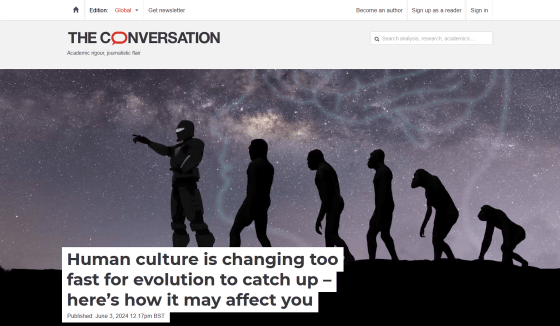It is pointed out that one of the causes of modern human suffering is the 'mismatch between human evolution and culture.'

Many of the problems that plague people living in modern society, such as poor mental health and lifestyle-related diseases, are said to be the result of rapid technological advances and modernization. Jose Yong, an assistant professor of psychology at
Human culture is changing too fast for evolution to catch up – here's how it may affect you
https://theconversation.com/human-culture-is-changing-too-fast-for-evolution-to-catch-up-heres-how-it-may-affect-you-227711

Evolutionary mismatch occurs when the traits and characteristics we have acquired through evolution are physically and psychologically out of sync with our environment. For example, nocturnal insects such as moths have developed phototaxis , using the light of the moon as a directional indicator to fly in the dark. However, in modern times, man-made street lamps and other lighting are still shining at night, and many nocturnal insects are attracted to these lights. It seems that a similar mismatch is occurring with humans.
One evolutionary mismatch that many people experience is the tendency to like sweet things. Sweet things are often rich in calories, so a sweet tooth helped our human ancestors find high-calorie foods. However, in modern times, food companies mass-produce foods high in refined sugar and fat to attract consumers with a sweet tooth, resulting in an increase in the number of people suffering from tooth decay and diabetes. In this respect, the human trait of liking sweet things is an evolutionary mismatch.

Evolutionary mismatches exist throughout society because the environments to which humans have adapted over a long period of time are quite different from modern society. For example, humans evolved to live in
Previous studies have also shown that social animals raised in crowded spaces experience competitive stress , which can have adverse physical effects such as reduced immune function and reproductive ability . Similar to animal studies, people living in crowded cities experience unprecedented levels of stress , and birth rates tend to decline as population density increases.
Furthermore, social inequality in modern society is different from the environment in which egalitarian hunter-gatherers lived. Humans evolved to care about social status, and in hunter-gatherer societies where inequality was relatively small, this motivated individuals to correct inequality to the extent that it was within their capabilities. However, social inequality in modern society has become so severe that some billionaires have assets that an average worker could only catch up with if they worked for hundreds of thousands of years. In such a situation, the human nature that evolved to care about inequality with others has the negative effect of amplifying anxiety about social status.
Social media also exacerbates the problem of social inequality. People tend to share their positive aspects online, which makes it easier to perceive others as superior than they actually are. In addition, the quantification of value through the number of likes or followers makes social inequality much more obvious.

The evolutionary mismatch in social inequality is strongly linked to aspects of modern society such as an obsession with academic credentials, competition for prestigious jobs, and materialism, which lead people to go into debt to buy items and experiences that signal their social status, or to make risky investments in hopes of making a quick win, Yong said.
A 2023 (PDF file)
When competition intensifies, people may internalize the pressure and experience anxiety and depression. The tendency for people who feel unable to meet the demands of modern society to turn to self-harm or develop depression is particularly pronounced in countries with a strong culture of 'shame,' such as Japan and South Korea.
And a growing sense that 'the problem of unwinnable social inequality is external' can lead to increased cynicism , aggression and hostility . This expression of external anger is common among ' incel ' groups of men who feel they are underserved when it comes to romantic and sexual partners, Yong said.

Yong argues that the evolutionary mismatch perspective could help us tailor our modern environments to better suit the traits humans have acquired: For example, changing urban environments to reduce congestion or increase access to nature could reduce people's stress and improve their well-being.
Additionally, lifestyle changes such as reducing consumerism and social media exposure, as well as judging jobs based on whether they are meaningful rather than the prestige they bring, may also help reduce evolutionary mismatch, Yong said.
Related Posts:
in Science, Posted by log1h_ik







